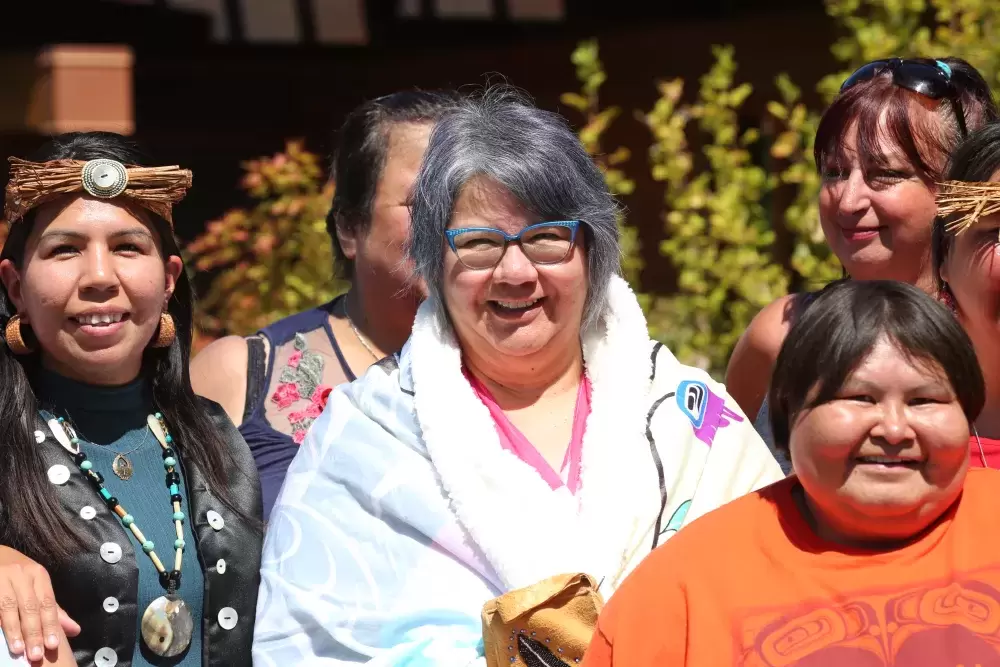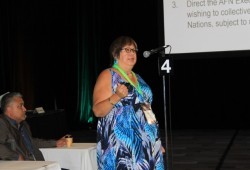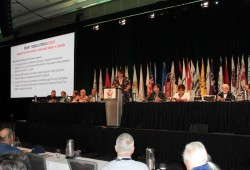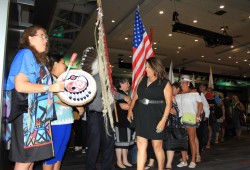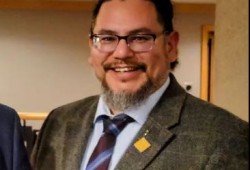It’s been a rough summer for the Assembly of First Nations.
On June 28 the advocacy organization’s national chief RoseAnne Archibald was ousted during a virtual assembly of delegates, amid complaints about her conduct from several senior staff.
Then the following month, as Archibald was pushing to be reinstated, the findings from a review of gender-based discrimination and sexual misconduct at the AFN was released during its annual general meeting in Halifax. The result of a multi-year investigation launched before Archibald’s term under former national chief Perry Bellegarde, the report stated “that toxic behaviours exist at all levels of the AFN, including the Secretariat, the Executive, Regional Offices, and the National Chief’s Office.”
Although Canada’s largest Indigenous advocacy organization will continue on under interim National Chief Joanna Bernard, who stepped in from serving as New Brunswick’s regional chief, questions have surfaced over how processes and conduct are being managed at the AFN, and if it serves the best interests of individual First Nations.
‘The time has come to change’
Archibald was the first woman to be voted into the top role when she was elected AFN national chief in July 2021. But her conflict with the organization was already evident. As Ontario regional chief, Archibald had backed an independent financial review of the AFN. Then in February 2021 she was investigated after staff within the organization had accused her of bullying and harassment. No complaints were filed in writing.
While she was national chief, the AFN Executive put Archibald under investigation again in the spring of 2022. Five senior staff filed complaints against her.
Archibald alleged that the AFN had spent over $2 million on investigations and legal fees in its efforts to remove her. In her online efforts to be reinstated this summer, the ousted national chief stated in a video that she had been fighting corruption at the AFN since October 2020, and that the investigations against her were intended to distract from larger issues in the organization.
“The time has come to change,” she said, urging chiefs to reinstate her and for the AFN to move ahead with a forensic audit that she backed. “Those sacred responsibilities are much higher than the political responsibilities or the administrative responsibilities that I might have at the AFN.”
Archibald was ousted on June 28 duringa virtual assembly that had 231 delegates, less than half of Canada’s eligible voting First Nations. More of a process should have been taken for such a major decision, said Waaseyaa’sin, Christine Sy, a professor of Gender Studies and Indigenous Nationhood at the University of Victoria.
“There’s questions raised because not all the chiefs were there,” she said. “People needed to be informed publicly that this was afoot and have a chance to sound in somehow.”
“It wasn’t an easy decision to remove her,” said Nuu-chah-nulth Tribal Council President Judith Sayers. “I really like RoseAnn, and I like working with her. She really supported the Nuu-chah-nulth in their fisheries issues. I like that she came into the communities.”
But Sayers noted that Archibald had broken the organization’s code of conduct and breached multiple policies, resulting in an “extensive” list of complaints against her. Sayers said that four of the senior staff who filed complaints against Archibald had worked with her before.
“I don’t think people would bring those kinds of complaints if there wasn’t some substance to them,” she said, noting how the grievances indicate leadership shortcomings while Archibald was in the AFN’s top role. “You have to have a team around you, a good team that’s supporting you, or you just can’t do your job. So you have to treat people with respect.”
Report notes ‘predatory culture’
Respect - or lack of it – became a prevalent issue at the advocacy organization this summer, when disturbing findings were revealed at the AGM Halifax. A report cited multiple cases of cyber bullying, sexual text messages, discrimination based on gender and sexual orientation, misogyny, unwelcome touching as well as other abuses of power. Members of the AFN’s Secretariat and Executive were surveyed, with 35 per cent reporting feeling unsafe at work, while almost 60 per cent had witnessed discrimination, violence or bullying.
“Female interviewees told us that personal boundaries are routinely violated by male employees, elders, knowledge keepers, and chiefs,” stated the report. “The panel heard that a predatory culture has become so pervasive and threatening within the AFN that female employees and leaders share information with each other about men who are unsafe to be around.”
“This was an issue for the whole time Archibald was national chief,” said Sy, who is from the Obiishkikaang Lac Seul First Nation in northwestern Ontario. “It was deeply ironic that weeks after she was ousted from her position, and the day after she was kicked out of the assembly online as a proxy member, that they came forth with this report.”
“The AFN needs to operate better,” said Sayers, who hopes that a forensic audit will further uncover changes needed within the organization.
“We’re trying to figure out ways that corruption can’t happen,” she continued. “I think we just need to put in place really strong policies, and enforceable policies, so that things can’t happen in the future.”
Advancing ‘collective aspirations’
John Jack, chief councillor for the Huu-ay-aht First Nations, has conflicted feelings when it comes to the AFN.
“I do find that some of the projects and programs that they run can be quite useful, especially when they interface with the federal government,” he said, noting that regional differences can complicate national lobbying efforts. “The governance structure creates incentives that do create difficulties for B.C. First Nations to put forward their interests, especially when it is in contrast with that of other First Nations east of the Rockies.”
The AFN is funded by departments within the federal government, transfer payments that amounted to nearly $42.2 million over the 2022-23 fiscal year. On its website it’s described as “a national advocacy organization that works to advance the collective aspirations of First Nations individuals and communities across Canada”. But identifying what these collective aspirations are, among a diverse mosaic of hundreds of First Nations across Canada, presents an inherent dilemma.
Jack admits to losing respect for the AFN after seeing the experience of A-in-chut, Shawn Atleo, an Ahousaht hereditary chief who rose to the organization’s top position in 2009. During his second term Atleo resigned in 2014 amid controversy over Indigenous support for Bill C53, the First Nations Control of First Nation Education Act.
“My trust of the organization is quite low,” said Jack. “The internal culture does not appear to have changed, and the incentives for the way that leadership is selected within the AFN makes it difficult for anything other than the lowest common denominator priorities to be put forward.”
But in the national scope of how Ottawa deals with Indigenous people progress can be found, a recent example being a $23.3 billion settlement for harm suffered by Indigenous children under Canada’s child welfare system. This compensation was approved by the Canadian Human Rights Tribunal on July 31.
Could such an initiative happen without a national advocacy group like the AFN?
“I think that the federal government needs it more than First Nations need it,” said Sy. “The federal government needs easy steps to disseminate its decisions and its power to First Nations status people.”
“It’s impossible, but yet the work must be done in transforming the AFN, or growing other ways of building this relationship with Canada, surviving this relationship with Canada, transforming this relationship with Canada,” she added.
“I see a lot of people calling down the organization, but I think they function within the constitution,” said Sayers. “The AFN is higher-level strategic politicking and lobbying. The AFN has always been an advocacy body, that’s what they’re supposed to do. They’re not supposed to be the people who are consulted, so you have to fight to make sure that doesn’t happen, that it’s the rights holders that make the decisions.”

